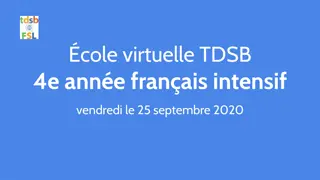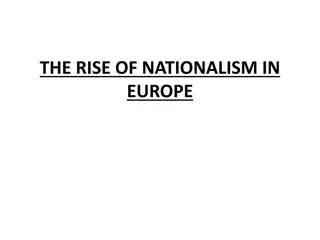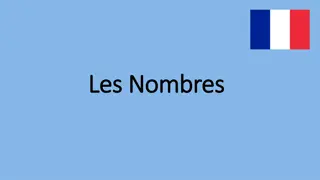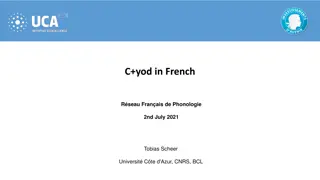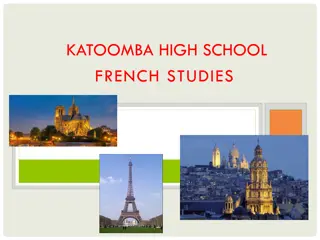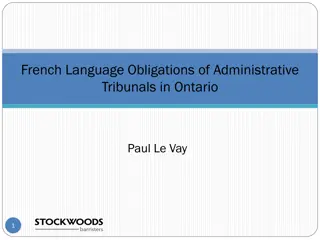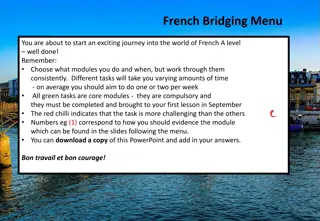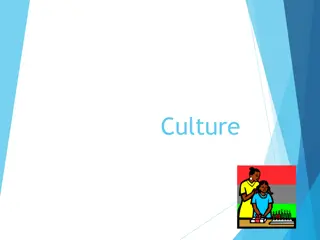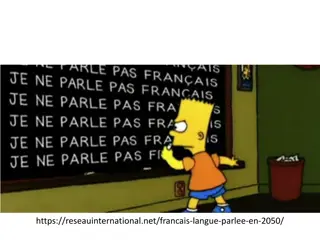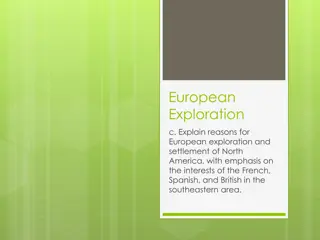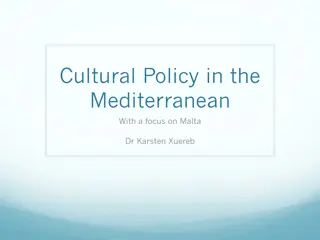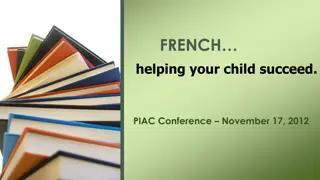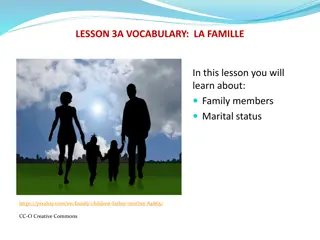Importance of Learning French for Cultural Exploration
Learning a foreign language such as French provides a gateway to other cultures and enhances one's understanding of the world. The National Curriculum emphasizes the significance of language education, particularly focusing on vocabulary acquisition, oracy, phonics, grammar, reading, writing, and more, to prepare students for global interactions and opportunities. CUSP French curriculum, guided by evidence-led practice, ensures a comprehensive development of young linguists by integrating key linguistic components like phonics, grammar, reading, writing, oracy, and vocabulary. Along with explicit French teaching in Key Stage 2, MFL programs in Early Years and Key Stage 1 expose children to various languages, fostering appreciation for diversity and promoting intercultural understanding.
Download Presentation

Please find below an Image/Link to download the presentation.
The content on the website is provided AS IS for your information and personal use only. It may not be sold, licensed, or shared on other websites without obtaining consent from the author.If you encounter any issues during the download, it is possible that the publisher has removed the file from their server.
You are allowed to download the files provided on this website for personal or commercial use, subject to the condition that they are used lawfully. All files are the property of their respective owners.
The content on the website is provided AS IS for your information and personal use only. It may not be sold, licensed, or shared on other websites without obtaining consent from the author.
E N D
Presentation Transcript
Modern Foreign Languages Why is French important? Intent Learning a foreign language is a liberation from insularity and provides an opening to other cultures. A high-quality languages education should foster pupils curiosity and deepen their understanding of the world. (National Curriculum)
Modern Foreign Languages National Curriculum statutory content The National Curriculum for maintained schools in England stipulates that the teaching of foreign languages is required at key stage 2 (ages 7 11). This can be in any modern foreign language (MFL). Academies and free schools are not required to follow the National Curriculum. However, Ofsted still expects them to teach a broad, rich curriculum [ ] that includes languages . Within the National Curriculum, clear guidance is given around expectations of the purpose of learning a foreign language. This includes preparing pupils for learning further languages and equipping them to study and work in other countries. Key aspects of study that are explicitly referenced in the National Curriculum for MFL include: Intent vocabulary acquisition varied oracy opportunities, including engagement in conversation phonics and accurate pronunciation grammatical knowledge reading and listening for meaning sentence composition simple writing tasks. These are all carefully represented in the CUSP French curriculum.
Modern Foreign Languages CUSP French is built around the principles of evidence-led practice to ensure that there is a focus on high-quality development of children as linguists. Core areas of study are revisited throughout the curriculum. Each unit of study focuses on phonics, grammatical structures, reading, writing, oracy and vocabulary. CUSP French has been designed to serve young linguists in the modern world. Key areas of focus have been deliberately selected to ensure that pupils are equipped with knowledge and language that will serve them in engaging with important and useful topics such as the environment, wellbeing and travel. The curriculum focuses not just on vocabulary acquisition but Intent
MFL in EYFS & KS1 In addition to explicit French teaching in Key Stage 2, all children in Early Years and Key Stage 1 will also encounter a range of other languages, including French, through activities such as answering the register in different languages, singing songs from other cultures and participating in European Day of Languages. Intent Laureate Community Academy benefits hugely from its community of pupils representing a wide spectrum of different nationalities and cultures, including children for whom English is an additional language. Our school seeks to encourage understanding and tolerance between people of all cultures and languages and all children are encouraged to share their knowledge of languages and cultural events, spoken and celebrated at home. Pupils may work with the MFL Leader to celebrate and promote other languages throughout the school e.g. Language of the Half Term.
MFL in EYFS & KS1 ELGs (from Early Adopter Framework) How this is achieved in EYFS Languages in KS1 Intent Being imaginative Sing a range of well-known nursery rhymes and songs. Singing days of the week and Heads, Shoulders, Knees and Toes in French. Singing the days of the week song. Learning to sing the colours song. People, Culture and Communities Explain some similarities and differences between life in this country and life in other countries, drawing on knowledge from stories, nonfiction texts and maps Saying Bonjour and Au revoir Children share and celebrate their home language. Children from an EAL background share their own festive traditions. Children celebrate all languages on the 26th September. Saying Bonjour in response to the register Saying Au revoir at the end of the day. Answering the register using languages from the language of the half term. Children from EAL backgrounds share their family s traditions with the class.
MFL in KS2 CUSP French long-term sequence There is a significant focus on revisiting throughout the curriculum with the aim of pupils mastering key knowledge that can be built on as they move through the programme of study. Intent
Content and Progression in KS2 Example (Year 3 Block B): Intent
Content and Progression in KS2 Example (Year 4 Block B): Year 4 (Example Block B): Intent
Content and Progression in KS2 Example (Year 5 Block B): Year 5 (Example Block B): Intent
Content and Progression in KS2 Example (Year 6 Block B): Year 6 (Example Block B): Intent





